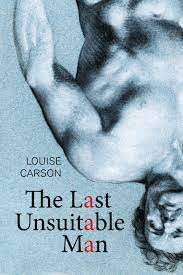Val's Book Reviews

The Last Unsuitable Man
By Louise Carson
Winnipeg, MB: Signature Editions, 2022
$17.95 / 9781773241159

Louise Carson’s 14th book, The Last Unsuitable Man, is a combination of mystery, music, love affairs gone wrong, and slow-paced twists and thrills.
The thing I liked best about it is the division of the book’s parts described in musical terms—Allegro, Andante, Scherzo and Presto (Lively, Moderately Slow, Upbeat and Extremely Fast)—although I did feel that Andante should have been first, as the story begins slowly and then gradually picks up the pace.
These musical expressions set the scene for the story of protagonist Claire Denman, a struggling mystery writer and opera lover, who is hired by an elderly, wealthy woman—Jane Robertson—to assist her in moving her three cats on a flight from Montreal to the Sunshine Coast of British Columbia. The reason Jane needs a travelling companion is because she is only putting one cat in cargo and wants the other two with her on the plane. Since the airline allow only one cat per person, Claire is hired to carry one. As Jane is moving west and will be renting a house on the Sunshine Coast owned by Ben (Claire’s brother) and near to his own property, Claire is more than happy to make the journey with the woman as an excuse to visit her brother and his wife Virginia, both of whom she hasn’t seen for a while.
Unsuitable begins as Claire is driving to Jane’s house where she will stay overnight so they can leave together early next morning to catch the flight from Ottawa to Vancouver. She has left behind her adult daughter, Tamzin, to take care of her own house and cat while she is away.
The first meeting at Jane’s almost empty house is strange on many levels. Jane has been packing up her things in order to sell her house and permanently move out west to a warmer climate and be near her other son, Alexander. At first glance, there are many characters flitting in and out of the story which Claire (and the reader) might find confusing. I constantly back-checked to be clear about who was who.
There is Jane’s son, Edmund, two house cleaners, Lulu and Frizette, who apparently take drugs, but as Jane informs Claire, “they clean all night sometimes. They say it’s the drugs—they don’t do serious drugs—just grass and a bit of meth.” Neither she nor her son appears to be bothered by that. While Edmund has a beer and Jane is constantly asking for another scotch, Claire is left much to her own devices in order to find her room for the night, the bathroom, and something to eat after her already long journey.
As if all this confusion is not enough to contend with, the author adds three more names to the story for the reader to digest. Jane’s troublesome three cats—Daisy, Kookla and Mercury—that make Claire wonder if the whole idea of this trip is a big mistake.

The flight west is stressful and upon arrival the next day in British Columbia, the author meets Jane’s other son, Alexander, who will drive them to their destination. While dozing on the plane, she thinks about the men in her past and wonders if they—“ex-husband, the two serious lovers, and the casuals”are still alive. Mostly, she reflects on the man she called “the Serb,” her married lover. She is thinking specifically about him because on the way to driving them to the airport, Edmund casually mentions Jane’s late husband and referred to him as “the Serb,” although his name is Matija: “How her heart had jolted when Edmund had said those two words in the car. What were the odds?” Could Claire be travelling with the wife of her ex-lover?
Here is where the story really picks up. Unfortunately, Claire’s sister-in-law, Veronica, must leave the next day to take care of her ailing uncle, and Ben will be joining her a few days later, which will leave Claire alone at their house to take care of things. After a very pleasant few days with her brother enable her to become familiar with the house again, she is on her own. And that is when a series of strange happenings begin, only interrupted by the author’s frequent descriptive prose of British Columbia’s scenery that tends to slow down the story.
Claire’s days are filled with writing poetry, watching and identifying the local birds, and exploring the nearby town. But when objects go missing and messes appear in the house that Claire can’t remember making, she begins to believe she is losing her mind. She is particularly afraid after Jane moves into the nearby house, which she is renting from Ben.
The most frightening part of the story for the protagonist is when she realizes whole days have been erased from her memory, most especially when Jane is found dead, followed shortly afterwards by her other son, Edmund’s lifeless body being found on the beach below the house. Claire had no idea that Edmund had come west and had assumed he was still back in Ontario.
Throughout the story, I had rooted for Claire and believed she had been framed for murder, but then the story takes a surprising twist. The ending will surprise you while keeping you guessing. What really happened? Louise Carson’s answer is well worth reading.
Link to Original Review
“The Ormsby Review, named for pioneering historian and UBC professor Margaret Ormsby, is a remarkable and comprehensive online review of more British Columbia books than you ever imagined existing — the west coast publishing market is lively. It covers fiction, poetry, politics, memoir and much else, as well as a lot of local and west coast history.” – Christopher Moore, September 14, 2020.
Editor and Publisher: Richard Mackie
Mission Statement: The British Columbia Review, formerly The Ormsby Review, is a lively and inclusive Vancouver-based online journal devoted to the literature, arts, culture, and society of British Columbia. Our mandate is to review books by BC-based writers wherever they choose to publish them. We review books from the member publishers of the ABPBC (Association of Book Publishers of BC), but we also review books that are privately printed, self-published, or published by BC writers at publishing houses elsewhere in Canada or abroad. When possible, we also find BC reviewers. Our accessible and authoritative reviews and essays, written by experts in their fields, are packaged as illustrated magazine articles.
The British Columbia Review works with writers, publishers, and literary professionals across Canada to promote books published by BC writers or about British Columbia in all its diversity. We include books by all authors, regardless of race, age, ability, sexual orientation, gender or gender identity, ethnicity, religion, political belief, marital or family status, and/or status as Indigenous, Métis, or Inuit.
The editorial offices of The British Columbia Review are located near Commercial Drive in East Vancouver, in the traditional, unceded, and sometimes overlapping territories of the Musqueam, Squamish, and Tsleil-Wauuth peoples. Indigenous British Columbia, the land on which we live and create, extends over a large area comprising three culture areas, eight language families, and 32 distinct languages. We endeavour to review all books by and about Indigenous BC. Those reviews can be accessed directly here.
